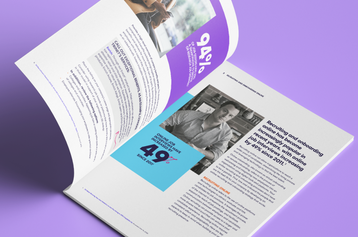Employee Success: How People Ops Can Help Your Company Thrive

Table of contents
- 1.How company culture impacts employee success
- 2.How job satisfaction and meaningful work contribute to employee success
- 3.Steps to create an effective employee success plan
- 4.The importance of professional development and actionable feedback
- 5.Increasing engagement: a key to employee success
- 6.Boosting employee engagement and reducing employee turnover
- 7.Making employee success a reality for your business
We all want to see our employees succeed, but what's the secret to helping them do so? Employee success is often characterized by an individual's professional growth, job satisfaction and tangible contributions to their role. It serves as a cornerstone for a thriving business environment. When employees succeed, they not only elevate their personal trajectories but also drive the organization's success overall.
In this article, we will delve deep into the multifaceted world of employee success. We'll explore its implications for an organization and how its cultivation can help propel a business toward innovation and growth. Let's dive in!
How company culture impacts employee success
Think of company culture like the invisible architecture of an organization, shaping behaviors, attitudes and the overall workplace vibe. A strong, positive culture helps foster a motivated and engaged workforce and optimal employee experience. Employees feel valued, aligned with the company's mission and empowered to succeed.
To harness this transformative power, businesses prioritize the contributing factors. These include open communication, recognizing and celebrating achievements, and cultivating an environment of continuous learning and collaboration.
How job satisfaction and meaningful work contribute to employee success
Job satisfaction can be measured in terms of the positive feelings an employee derives from their role. These feelings often stem from a combination of rewards and recognition, work environment and alignment with personal goals.
Meaningful work can also play a part. It's characterized by duties that resonate with an individual's values, passions and purpose and impart a sense of significance to their contributions.
There's a strong connection between the two. When employees perceive their work as meaningful, it naturally amplifies their job satisfaction. And when workers feel acknowledged and appreciated for their efforts, it boosts morale and solidifies their sense of purpose, further elevating their job satisfaction.
Steps to create an effective employee success plan
An employee success plan is a strategic blueprint tailored to individual employees, designed to map their professional growth, skills development, and trajectory within an organization. For companies, it represents an investment in their most valuable assets — their people. Employees should not only be satisfied but also achieve goals to evolve professionally in alignment with company goals. Here are some basic steps to crafting an effective employee success plan of your own:
- Assessment: Begin by evaluating the current skills, strengths and areas of improvement for the employee. Understand where they are versus where they want to be.
- Goal setting: Establish clear, measurable objectives that align with both the individual's aspirations and the company's strategic direction.
- Skills development: Identify necessary trainings, workshops or mentorships that can bridge gaps between the employee's current capabilities and the desired skill set.
- Regular check-ins: Schedule periodic reviews to track progress, address challenges and adjust the plan as necessary.
- Feedback loop: Establish a two-way communication channel whereby both the employer and employee can share insights, feedback and recommendations for continuous improvement. Periodically encourage employees to use it, too.
The importance of professional development and actionable feedback
Employee success, and eventually an organization's success, often is propelled forward by a commitment to effective professional development. This is the ongoing process of learning, skills acquisition and career advancement for employees. For companies, fostering professional development requires thoughtful planning. This might include organizing workshops, trainings or conferences and diligent follow-through to ensure that employees can apply what they've learned.
Employer-employee feedback can go a long way toward helping employees perform to their potential and personal-professional satisfaction. Therefore, guiding employees' success also requires a commitment to providing actionable feedback. Actionable feedback is specific, constructive, directive input that an individual can use to improve performance or rectify errors. For instance, rather than demanding, "Improve your report," a manager might suggest, "If you incorporate more data analytics in your report, you may see clearer insights."
Effective employee feedback typically involves insights, opinions and suggestions about company processes, work environment or management practices. It can be gathered via formal or informal discussions, employee surveys, official communication channels and other means. The primary goal is to offer companies a candid mirror to their operations and highlight areas of success and opportunities for improvement. By analyzing this data, management can make informed decisions that'll enhance the employee experience, leading to higher retention and a more motivated workforce.
Increasing engagement: a key to employee success
Human resources, evolving into the contemporary "People Ops" model, plays a pivotal role in cultivating employee success. People Ops goes beyond traditional HR tasks, focusing on a more holistic and proactive approach to employee well-being, engagement, and growth. People Ops serves as the backbone of a thriving workplace where employees are not just managed but genuinely empowered to achieve goals.
Boosting employee engagement and reducing employee turnover
Essentially, People Ops seeks to build a deep sense of loyalty and belonging among employees by meeting their professional and personal needs. Think of it like the bridge between the workforce and the organization's higher-ups, ensuring everyone's on the same page. Strategies People Ops/HR can implement to reduce turnover and boost employee retention include:
- Provide learning and development opportunities. Continual learning keeps employees engaged by giving them a clear path for growth and skill acquisition. Offering workshops, training, mentorship or tuition reimbursements can motivate employees to advance and help them feel valued by the company.
- Foster open communication. Creating an environment where employees feel comfortable sharing feedback, discussing concerns and contributing ideas is vital. Regular check-ins, town hall meetings and anonymous feedback channels can give employees a voice. Those who feel heard tend to also feel more connected to the company's mission.
- Recognize and reward achievements. Regular employee recognition, whether through awards, bonuses or simple verbal appreciation, boosts morale and reinforces positive behaviors. Celebrating milestones, both big and small, shows employees that their contributions matter.
- Promote work-life balance. Flexible working hours, remote work options and promoting mental health initiatives can assist employees in both their professional and personal lives. Such support can help employees perform at their best within and outside of the workplace.
- Encourage team collaboration and social interactions. Building strong interpersonal relationships at work can enhance overall employee engagement. Organize team-building activities, workshops and social events to foster camaraderie, collaboration and a sense of belonging to a positive workplace environment. Team goals can also be a great way to keep employees focused on the overall picture.
By prioritizing employee success, People Ops or HR teams can cultivate an environment where staff stays, thrives, and contributes positively to the company's success.
Making employee success a reality for your business
Now that you have the roadmap toward employee success, you might be ready to spring into action. But what if you don't have the time or resources to implement this kind of process? Consider a PEO such as TriNet as a potential provider.
TriNet's comprehensive suite of HR tools and services offers senior leadership a streamlined and effective approach to help champion employee success. With its array of integrated HR solutions, TriNet can help you bridge the gaps between the objectives of your organization and the success of your employees. Reach a representative today to learn more.
This communication is for informational purposes only, is not legal, tax or accounting advice, and is not an offer to sell, buy or procure insurance.

TriNet Team
Table of contents
- 1.How company culture impacts employee success
- 2.How job satisfaction and meaningful work contribute to employee success
- 3.Steps to create an effective employee success plan
- 4.The importance of professional development and actionable feedback
- 5.Increasing engagement: a key to employee success
- 6.Boosting employee engagement and reducing employee turnover
- 7.Making employee success a reality for your business





